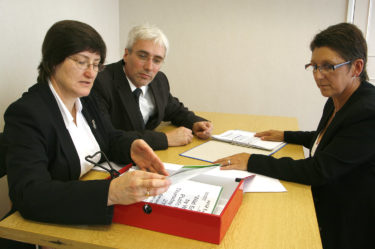After wading through resumes, cover letters, and recruiter’s recommendations, you eventually get to the interviewing process, which should be the ultimate indicator of who will or will not be suitable for a job. As a hiring manager though, have you ever completed a series of interviews still feeling like you’re in the dark about the candidates’ true abilities, or how well they will perform upon hire? Do you ever find yourself deciding who your next employee will be on a whim or based off a hunch, potentially creating a hiring risk?

What if you were able to get an accurate inside scoop regarding a candidate’s capabilities early on, before even having to invest time looking intently through their resume? You can obtain this transparency and learn how to predict a candidate’s chance of success by utilizing a sales personality test the moment an applicant makes contact with you. Sales personality tests were first developed in the 1980s by industrial psychologists who wanted to help companies get a clearer picture of who they were hiring, particularly because success in sales so often lies within the soft skills that are difficult to pinpoint right away. Now sales personality tests are used around the world to ensure the right people are chosen for a position.
Certain providers like SalesTestOnline even guarantee a 90% accuracy rate, which is only supported by their 97% reorder rate as many have tried the service once and found it to be beneficial. The non-invasive tests only take candidates 10 minutes to complete, and measure essential sales personality traits like assertiveness, sense of urgency, emotional stamina, empathy and more. These qualities are then measured against a target profile for the job being applied for. The closer an applicant scores to the benchmark, the more likely they are to fare well in that position long term. Targets are derived from deep analysis of the company and the needs of each position, and can even be customized to reflect the qualities of your strongest salespeople.
Implementing these tests saves hiring committees time, and by extension, company resources as well. It also prevents from having to undergo additional hiring unnecessarily and instead shines light on the applicants that would be strong based on their sales personalities right away. Conversely, it saves ill-fit applicants time and energy by allowing them to pursue other fields they’re better suited for, and not hiring them for a job they’re likely to leave in just a few short months.
Hiring, especially multiple times a year for the same job, can be frustrating and disillusioning. What companies need are new strategies as the traditional ways rarely provide employers with sales candidates that stick. By addressing the unique needs of each position, testing based off these targets, and testing for the soft skills that can rarely be taught, employers are less likely to be led-on or swayed by strong interviewees, with little insight into how they’ll perform upon hire. What it will do is allow companies to finally focus less of their energies on hiring and more on attaining the numbers they need to grow.


